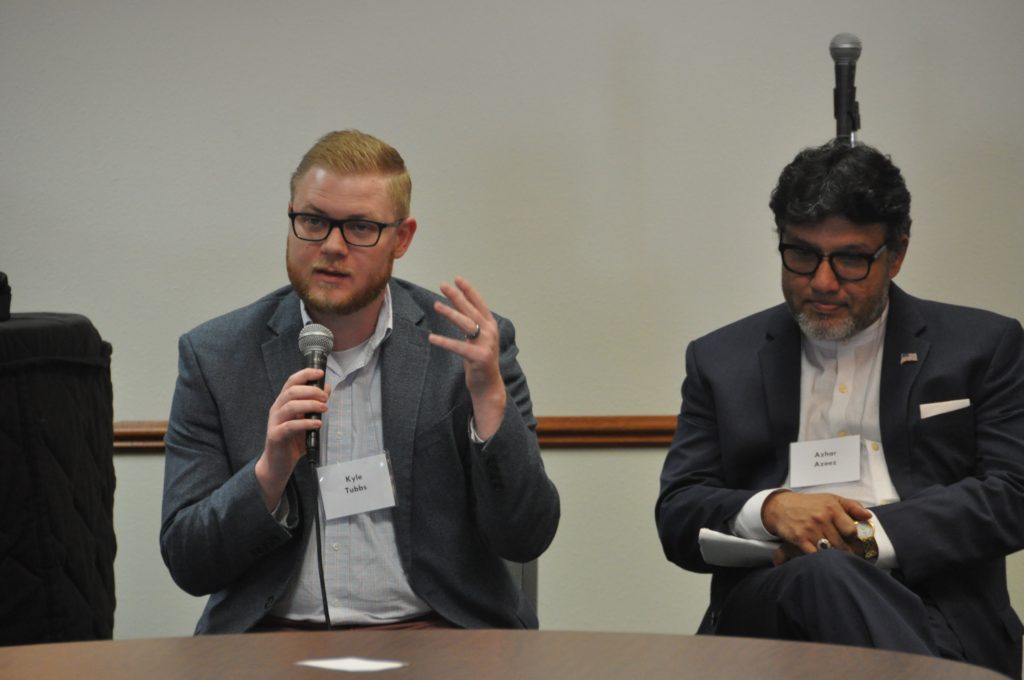
Kyle Tubbs speaks at the Baptist-Muslim Dialogue on citizenship rights and religious liberty alongside Azhar Azeez, president of the board of the Islamic Society of North America.
By Kyle Tubbs
I’m privileged. Over the last couple of years, my eyes have been opened to the numerous advantages I experience that I did not earn. As a Caucasian, heterosexual, cisgender, able-bodied male, society treats me differently than many of my friends.
On April 16-19, my privilege came into sharper focus as I attended the Third National Baptist-Muslim Dialogue in Green Lake, Wisconsin. There, I joined Baptist and Muslim leaders from across the country to discuss issues related to peacemaking, religious liberty and partnerships.
Through the personal stories my Muslim friends shared during this experience, I felt the weight of another privilege I possess: religion. The dominant cultural religion of my city, state and country provides me with a level of religious privilege. I travel quite a bit, and I’ve never been eyed with suspicion as I go through security. My entire life, my school calendars have Christian days off. I receive invitations to pray at civic events in our city. As a Christian pastor, I am gifted privilege in our culture, which I did not earn.
My church in Round Rock, Texas, hosts regular interfaith gatherings for the community in public spaces. While we are the sponsor group, we host the conversations in neutral spaces so people of all faiths feel welcome to attend and participate.
One of the topics which regularly comes up in these interfaith gatherings is privilege. What I hear from my Buddhist/Hindu/Jewish/Baha’i/Muslim friends is a plea to utilize privilege for the common good. They ask those of us who are Christian to not be complacent, but instead work alongside our sisters and brothers from other religions for justice.
Similarly, my new Muslim friends I met at the National Baptist-Muslim Dialogue had a request for those of us who are Baptist: Speak up for justice. Speak up in our churches, in our schools, in our neighborhoods, in public shared spaces, in businesses and in the local market. Silence doesn’t help move justice forward.
I had the opportunity to present on religious liberty during the dialogue. I reminded participants that Baptists started as a small religious minority in both England and America. Early Baptists experienced persecution and knew what it was like to live life in fear of government interference in their religious practice. This spirit played an important role in Baptists advocating for religious freedom in the First Amendment. Baptists have been ardent advocates of religious liberty not only for themselves, but for everyone.
Interfaith dialogue presents practical opportunity to discuss issues related to religious liberty. In Wisconsin, I heard the stories of my Muslim brothers and sisters and felt the weight of the persecution they experience regularly. I was humbly reminded that, as a privileged religious person, I am not a savior; rather, I can be an advocate on their behalf based on what they need. The key is listening. If I’m not in dialogue with my interreligious neighbors, how can I know what they need and how I can act?
So, what should I do from here based on this experience with Baptists and Muslims dialoguing?
One, I will continue to listen. I’m waking up to my privilege largely because I’m listening before speaking and trying to learn from others’ experiences, which may be different from my own.
Two, I will continue to commit to interfaith dialogue. The answers I received by asking my Muslim friends this basic question, “What is it like to practice Islam in the United States?” was enlightening.
Three, I will continue to support religious liberty causes, which is a primary reason I support the work of the BJC. I know the brilliant staff is working hard to educate and advocate for religious freedom.
Finally, I believe if I am listening, talking to people of other faiths and supporting religious freedom in their lives, then I am loving my neighbor. When Jesus said to love neighbor as self, I believe the interreligious neighbor is implied, too. Everyone is our neighbor. And if I am going to love my neighbors well and treat them as I want to be treated, then I will advocate for religious liberty not only for myself, but for everyone.
The Rev. Kyle Tubbs is a 2015 BJC Fellow. This summer, he is transitioning from Lead Pastor of Peace of Christ Church in Round Rock, Texas, to Decatur, Georgia, where he will serve as New Church Starts Manager for the Cooperative Baptist Fellowship.
This article appeared in the May/June 2018 edition of Report from the Capital. You can read a digital version of the magazine or view it as a PDF document.




